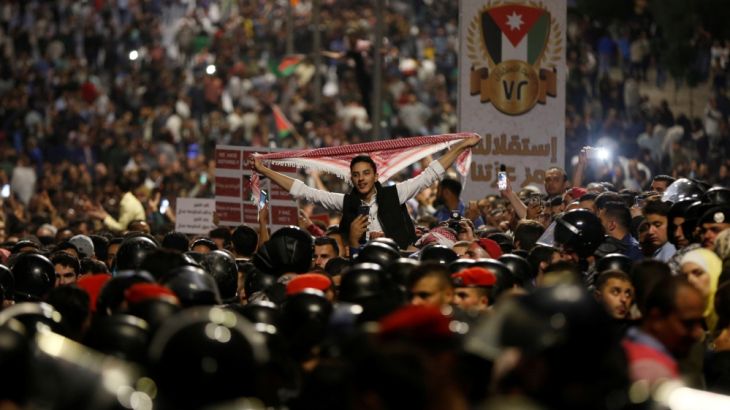Jordanians vow to continue protests, demand ‘new approach’
After PM’s resignation, protesters call for government to adopt transparent new approach to how it operates.

Jordanians have vowed to continue protesting after the resignation of the country’s prime minister, broadening their demands to include a complete overhaul of the government’s system and approach.
The protests began last week amid anger over an income tax reform bill and price increases.
Prime Minister Hani al-Mulki resigned on Monday, a move seen by many as an attempt by the kingdom to defuse the outrage over the economic policies.
But protesters are expected to again take to the streets later on Monday for the fifth consecutive day, demonstrators and organisers say, calling for a “new approach” to how the government operates.
“We’re going to send the government a new message today,” Odai Nofal, who hails from the province of Zarqa, told Al Jazeera.
“That power lies with the people, that the government needs to be cautious when dealing with its citizens from now on,” the 28-year-old said.
“If they want to resolve the country’s economic crisis, they should place more of the burden on established corporations rather than their people.”
While Jordanians have been chanting and calling for the removal Mulki, who assumed office in 2016, they have also called for transparency, a clear set of goals, and for overall change in government policies.
They also want to reintroduce subsidies on bread and oil process.
“We want to dissolve the government and demand a completely new approach to how the government deals with economic and social-related matters,” 26-year-old Hussein Smadi, told Al Jazeera.
The young lawyer has been among the first to call on the recent protests in Jordan, which began on Thursday.
“Day by day, the number of people in the streets are doubling,” Smadi said. “This is virtually unprecedented in a place [like] Jordan.”
‘Nothing to lose’
The protests in Amman have been organised and led by an independent group referred to as Hirak Shababi, or youth movement, as well as by the various unions representing tens of thousands of employees across the country – including the lawyers’ syndicate and the press syndicate.
An overwhelming number of politically “aware” young people took part in the demonstrations, breaking the “fear” barrier that previously existed, Smadi explained.
“People realised they had nothing to lose,” he said, noting that those who participated came stripped of their political affiliations.
|
|
Unions have also called for a general strike on Wednesday, and vow to continue demonstrating until a new approach to the government’s policies is introduced.
Hiba Quntar, a member of Jordan’s press syndicate, told Al Jazeera that a change of politicians is not enough.
“The people want a change in the approach and not the people per say,” she said.
Jordan has long suffered from economic problems and remains heavily reliant on foreign aid.
As part of a series of economic reforms to decrease Jordan’s national debt of more than $37bn, which is equivalent to about 95 percent of the gross domestic product (GDP), the government introduced price rises on basic commodities that have incensed many Jordanians.
Earlier this year, Jordanians demanded the removal of bread subsidies and protested a sales tax increase.
The new draft bill would, therefore, increase the burden on Jordan’s middle class and poor specifically, who already pay a form of sales and income tax, if the new government does not repeal the bill.
The king has reportedly tasked Education Minister Omar al-Razzaz to form a new government. However, Jordan’s official news agency, Petra, has not confirmed the appointment.
Al-Razzaz, a former World Bank economist, is described as a more likeable and accepted character among the Jordanian people.
But for those like Smadi, the demand for a new government approach is one they will not compromise.
“We don’t care if it’s the same faces – as long as they’re doing things differently,” he said.
‘This time it’s different’
Similarly, Ahmed Momani, a civil rights activist based in Amman, explained that the government has not been in line with the country’s parliament.
“We want a national salvation government,” Momani, who says he was among the first five people to kick-off the latest wave of demonstrations, said.
A lack of political representation was especially apparent when the country’s syndicates called for the nationwide demonstrations, Momani noted.
“How is it that syndicates have replaced political parties? They shouldn’t be the ones calling for demonstrations but they did,” he said.
Jordanians have also called for an increase in developmental projects, but the recent increase in taxes and a potential one on the way has pushed many to realise that they may no longer be able to make ends meet.
The cost of fuel has increased five times in 2018 and electricity bills have shot up by 55 percent.
The government’s economic reform measures stem from the $723m three-year credit line that it secured from the IMF in 2016.
But Jordanians also blame corrupt government officials for the country’s economic downfall.
“Why should I pay for the actions of successive governments,” Momani said.
Experts noted that the economic issues in Jordan are structural in nature, making it increasingly difficult for the government to provide basic services while the economic growth rate is on the rise.
The latest move by the royal palace to accept the prime minister’s resignation has given some Jordanians hope.
“They responded with our initial demand in a matter of days, I’m sure they will continue to listen and respond to our demands that are in line with the constitution,” Nofal said.
“This time it’s different … This is a new phase for Jordan.”